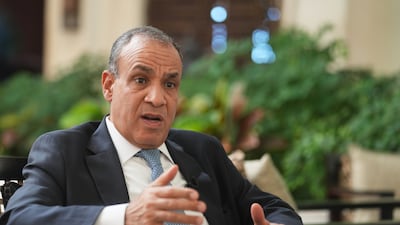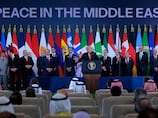Egypt is pushing for a UN Security Council resolution “as soon as possible” to establish a peacekeeping force in Gaza, Egypt’s Foreign Minister Badr Abdelatty told The National.
In an interview in Aswan, Mr Abdelatty laid out the foundations of the International Stabilisation Force and the main mandate of the proposed Board of Peace, which is to monitor the flow of aid funds.
He said, however, that “it will not be acceptable to have foreigners” running Gaza, insisting that the mission of the force and the Board of Peace should be to provide support for Palestinians to run their own affairs.
“We need first to have a Security Council resolution as soon as possible to endorse this plan and also to give legitimacy for this ISF, the International Stabilisation Force, and to identify its own mandate and its own mission,” said Mr Abdelatty.
“This is very, very important,” he emphasised, adding that Egypt is “standing ready to participate in all formats but within specific parameters” to be detailed in the Security Council resolution through a “clear-cut mandate”.
Sources told The National earlier that Cairo is expected to lead a four-nation Gaza stabilisation force made up of at least 4,000 troops from Egypt, Azerbaijan, Turkey and Indonesia.
Already, the sources said, it has been decided that the force will not have heavy weapons and will rely mainly on light firearms and armoured vehicles. It would initially be deployed in areas from which Israel's military had withdrawn under the first phase of US President Donald Trump's plan.
“The mission should be peacekeeping, not peace-enforcing,” said Mr Abdelatty.

He explained that the force – as well as the Board of Peace that Mr Trump will lead, alongside other politicians such as former British prime minister Tony Blair – should also assist in providing basic services to the people in Gaza and support for the police officers through training and capacity building.
“It will not be acceptable, of course, to have foreigners running Gaza,” he added.
Keeping the US engaged
Mr Abdelatty said the Board of Peace is there to provide support, liaise with Israel, and “monitor the flow of money and funds for the humanitarian aid and the reconstruction of Gaza”.
“This money will come from donors, and they have the full right to make sure that there is a monitoring mechanism and supervision where the money will be spent,” he said.
While the first phase of the Gaza ceasefire agreement has been largely implemented, the situation on the ground remains complex. Attention is now turning to the second phase, which would focus on the break-up of Hamas, ensuring Israel’s full withdrawal and determining Gaza’s governance, but worries over a collapse of the truce have emerged in recent days.
Israel and Hamas have accused each other of breaking the deal. At least 44 people were killed in dozens of Israeli air strikes across Gaza on Sunday, shattering a week of relative calm since Mr Trump’s truce was announced.
Israel said the series of strikes was provoked by Hamas militants firing gunshots and an anti-tank missile at its troops in Rafah, in southern Gaza, an attack that the group denied carrying out. The Israeli military said two soldiers were killed.

Many fear the escalating distrust could derail the agreement. Egypt, along with the US, Qatar and Turkey, has served as a key mediator between Israel and Hamas throughout the war.
“The challenges are there, but it’s all about both parties fulfilling their commitments, and, above all, keeping the Americans engaged. That's why we are in daily contact with them,” said Mr Abdelatty.
“We have to engage with the Americans because this is the main guarantee for the implementation of the Trump peace plan. And the only guarantee to make sure that the parties will uphold to their own commitments is the involvement and the engagement of President Trump himself as well as the United States.
“Without American involvement, without President Trump's involvement, it would have been very difficult to leverage [Israeli Prime Minister Benjamin] Netanyahu and Israel to put an end to this aggression and the war on Gaza.”
‘Only game in town’
Last week, political leaders from around the world convened in the Egyptian leisure resort of Sharm El Sheikh for a ceremony to sign the ceasefire deal in Gaza. Mr Trump declared “peace in the Middle East” at the summit. The deal paused more than two years of war in Gaza that killed more than 68,000 Palestinians in Israeli attacks and left much of the enclave in ruins.
Under the agreement, Hamas must hand over all remaining Israeli hostages – living and dead. About 15 of 28 bodies are still to be returned. Israel blames Hamas for not doing enough to retrieve them, while Hamas says it is facing challenges in recovering all the bodies.
"The issue of the return of the remains of the deceased bodies is ongoing. It's not easy because you have huge debris and explosive devices, and that's why it will take some time,” said Mr Abdelatty.
“The second phase will be more complicated. But we have no other option. This is the only game in town. We will do everything in our power to start the negotiations for the second phase as well as to make them successful."
A Hamas delegation, led by chief negotiator Khalil Al Hayya, arrived in Cairo on Sunday to follow up on the implementation of the ceasefire deal with mediators and other Palestinian groups, Hamas said in a statement.
Mr Abdelatty noted that a conference on the early recovery and reconstruction of Gaza, which Egypt will host in November, will be “of great importance”.
“[It will be an] international conference under the co-chairmanship of Egypt and the United States – with full participation of many countries, including Italy, Germany, France, Spain, the European Union, the Gulf Co-operation Council, Japan, the United Nations and the World Bank,” he added. “We need to create more facts on the ground to make the option of returning to war more difficult.”
Asked whether Hamas would ultimately agree to disarm, Mr Abdelatty said: “There are obligations on both sides, and they have agreed to implement them. Hamas accepted the Trump peace plan and welcomed it.”
He said Israel, which has been using aid and food as bargaining chips in its negotiating strategy, must also meet its commitments, “especially regarding withdrawal from agreed lines and allowing the flow of humanitarian and medical aid, as well as construction materials”.
Mr Abdelatty noted that the number of aid lorries entering Gaza had increased. “We are pushing very hard to allow more trucks,” he said. “We need to flood Gaza with food and humanitarian supplies. We have nearly 50,000 injured people in Gaza who need urgent medical attention.”
Lebanon and Sudan
On Lebanon, Mr Abdelatty said Egypt has “full confidence in the leadership and wisdom” of President Joseph Aoun and “full faith” in Prime Minister Nawaf Salam’s government. “They are moving in the right direction, and we believe that this is a very important opportunity,” he added.
Lebanon is under heavy pressure to disarm non-state actors, including the powerful Iran-backed Hezbollah. This month, army commander Gen Rodolphe Haykal briefed the Lebanese government on efforts to disarm the militant group, a month after the cabinet approved the plan.
Israel has kept up regular strikes in Lebanon on what it says are Hezbollah targets despite a ceasefire reached last year, and has maintained its troops in five locations it deems strategic.

“We have, first of all, to end the Israeli occupation of the five locations in south Lebanon in order not to give any excuse for any party to say that we have to be there to fight and end the occupation,” said Mr Abdelatty.
"I had a very long discussion in Sharm El Sheikh with [US special envoy] Tom Barrack on that, and he is in agreement with me that the starting point is to put an end to the Israeli occupation" and violations of Lebanese airspace as well as releasing Lebanese detainees. He said Egypt is providing full support and training to the Lebanese army.
Another conflict in which Egypt is invested in helping to end is the war in Sudan. In September, at the invitation of the US, foreign ministers of the US, Saudi Arabia, Egypt and the UAE, known as the Quad, engaged in extensive consultations on the war. The new peace proposal called for an initial three-month truce followed by a return to civilian rule in which the Muslim Brotherhood is kept out of power.
The Egyptian official said he hopes the upcoming Quad conference will deliver tangible results. He did not specify when the meeting will be held.
“The Quad declaration of the 12th of September provided a road map for settling the conflict in Sudan through having humanitarian troops leading to a ceasefire, which will pave the way for an inclusive, transparent and comprehensive political process under Sudanese ownership,” he said. “We cannot tolerate having the whole city of El Fasher under siege for more than 550 days."
El Fasher, a city held by the Sudanese armed forces, has been besieged by the paramilitary Rapid Support Forces since May 2024. Tens of thousands of residents have fled shelling.



